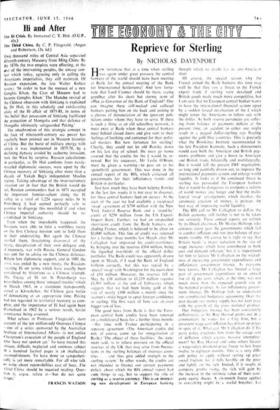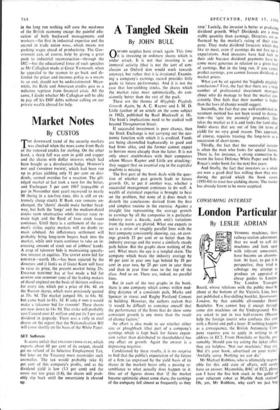THE MUMMY' TArl enOVV
Reprieve for Sterling
By NICHOLAS DAVENPORT
Howfortunate that at a time when sterling was again under great pressure the central bankers of the world should have been meeting at Basle for the annual meeting of the Bank for International Settlements! And how fortu- nate that Lord Cromer should be there. saying goodbye after his short but stormy term of office as Governor of the Bank of England! One can imagine these stiff-necked and collared bankers patting him on the back and joining in a chorus of denunciation of the ignorant poli- ticians under whom they have to serve. If there is such a thing as an old schoolboy network, it must exist at Basle when these central bankers meet behind closed doors and give vent to their feelings of loathing and contempt for their politi- cal masters. But how fortunate for sterling! Clearly, they could not let old Rowley down on his last day of school. He must go home assured that the credits for the £ would be re- newed. But his successor, Mr Leslie O'Brien, must be given a warning—to pass on to his spendthrift government. This was done in the annual report of the BIS, which criticised all governments for their inflationary trends and Britain in particular.
Just how much they have been helping Rowley in the last few weeks it is not easy to discover, for these central bankers feed on secrecy. At the start of the year we had available a reciprocal 'swap' agreement of $750 million with the New York Federal Reserve Bank and a 'stand-by' credit of $250 million from the US Export- Import Bank. Further, we had an unspecified short-term credit from the Basle bankers, ex- cluding France, which is believed to be close on $1,000 million. This line of credit was renewed for a further three months last March after Mr Callaghan had improved his credit-worthiness by bringing into the reserves £314 million, being the liquefied two-thirds of the official dollar portfolio. The Bask credit was apparently drawn upon in March, if I read the Bank of England bulletin correctly. but this was repaid by a special 'swap' with Washington for the equivalent of £54 million. However, the reserves fell in May by £38 million to £1,219 million (against £1,303 million at the end of February), which suggests that we had been losing gold at the rate of nearly £100 million a month since the seamen's strike began to upset foreign confidence in sterling. The first week of June saw an even bigger rate of loss.
The good news from Basle is that the Euro- pean central bank credits have been renewed on a multilateral basis for a further three month; —this time with France participating in a separate agreement. (The American credits did not, of course, come up for renegotiation at 'Bask.) 'The object of these facilities,' the state- ment said, 'is to relieve pressure on the official reserves of the UK that may arise from fluctua- tions in the sterling balances of overseas coun- tries . . . and thus give added strength to the sterling system. In other words, the credits are not intended to finance our current payments deficit, about which the BIS annual report had rude things to say, but to support the role of sterling as a reserve currency. This is an interest- ing new development in European banking thought which no doubt has its anti-American slant.
Of course, the special reason why the French joined the Basle bankers this time may well be that they saw a threat to the French export trade if sterling were devalued and British goods made much more competitive, but am sure that no European central banker wants to have the international financial system upset by a sudden forced devaluation of the £ which might tempt the Americans to follow suit with the dollar. As both reserve currencies are suffer- ins from balance of payments deficits at the present time, an accident to either one might result in a pegged dollar-sterling rate floating against the gold bloc countries. This is precisely what the Brookings Institute recommended to the late President Kennedy. Such a denouement would ease both the American and British pay- ments problems and give a boost to American and British trade, bilaterally and multilaterally. But it would kill the present IMF negotiatiOn, so long and painfully drawn out, to improve the international payments system and enlarge world liquidity. It looks as if the continued threat to sterling has persuaded the European bankers that it would be dangerous to postpone a reform of world money any longer and that the multi- lateral 'swap' arrangement, which involves the automatic creation of money, is perhaps the best way of improving world liquidity.
The BIS call to Mr Callaghan to deflate the British economy still further is not to be taken too seriously. These annual reports are written by its Dutch chairman, Dr Marius Hohrop, who censures every year the governments which fail to combat inflation and run into balance of pay- ments trouble. Of course he is right to say that Britain needs 'a major reduction in the size of wage increases which have contributed to both cost and demand inflation,' but it is impertinent for him to lecture Mr Callaghan on the wicked- ness of increasing government expenditures and inflationary government finance. As everyone here knows, Mr Callaghan has limited a large part of government expenditure to an annual rise of 41 per cent, which, at the time, was not much more than the expected growth rate in the national product. As for inflationary govern- ment finance. Dr Holtrop fails to understand our complicated budgetary accounting. Over the past decade our money supply has not kept pace with the grow th of the gross national product.
Our budgetary finance has been consistently deflationary, as Sir Roy Harrod points out in a commentary he writes for a City firm, but a persistent wage-cost inflation has driven up prices in spite of it. What can Mr Callaghan do if his party policy precludes him from the savage sort of deflation which creates massive unemploy- ment? Sir Roy Harrod and some others favour a wage-sahol-dit idend-price freeze to last from twelve to eighteen months. This is a very diffi- cult policy to apply without setting up great social friction, for it falls harshly on the Tibor and lightly on the rich. Indeed, if it results in company profits rising, the rich will gain by the increase in the intrinsic value of their com- pany equity shares. A six-month freeze applied to everything might be a useful breather, but
in the long run nothing will cure the weakness of the British economy except the painful edu- cation of both backward managements and workers—the first in industrial expertise and the second in trade union nous,. which means not pushing wages ahead of productivity. The Gov- ernment can, of course, help by giving a great push to industrial reconstruction—through the IRC—but the educational force of such speeches as Mr Callaghan made at Great Yarmouth, when he appealed to the seamen to go back and de- fended the prices and incomes policy as a means to an end, should not be underestimated. Mean- while, the Basle and American credits give us a welcome reprieve from financial crisis. All the same, I doubt whether Mr Callaghan will be able to pay off his IMF debts without calling on our private wealth abroad for help.































 Previous page
Previous page